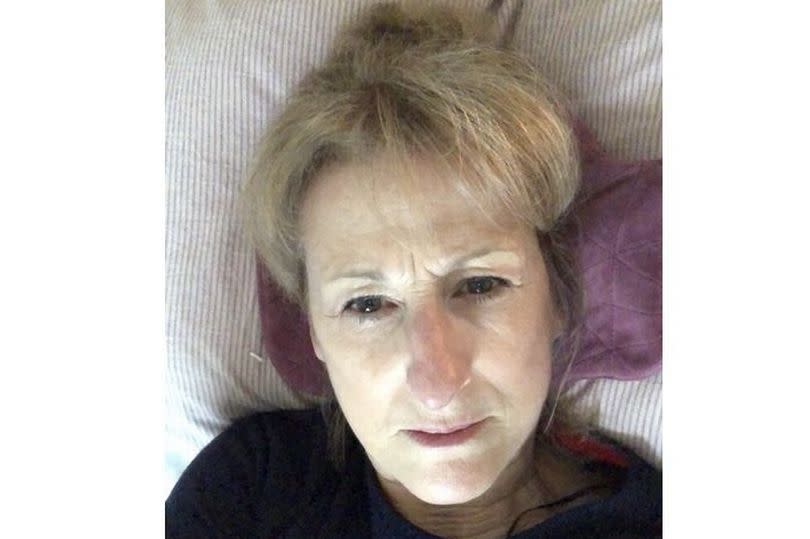Exeter woman says illness brought on by mosquito bites is like 'someone pouring acid over your brain'

An Exeter woman suffers from a chronic illness which she says feels like "someone is pouring acid over your brain". She believes it was brought on after she contracted Lyme disease decades ago.
Joanne West, 63, says she contracted the disease when she was in her 20s, following a trip to Australia, where she is thought to have sustained more than 100 mosquito bites. She now lives with myalgic encephalomyelitis (ME), sometimes referred to as chronic fatigue, which has been exacerbated by stressful events over the course of life, such as moving house, leaving her partner and the death of her mother.
According to the NHS wesbite, ME can cause symptoms such as feeling extremely tired, sleep problems, brain fog, pain and flu-like symptoms. Joanne has also experienced complications from contracting the Epstein-Barr, which usually causes glandular fever.
"I wake up in the mornings and I can't describe the pain," she told DevonLive. "It's like someone is pouring acid over your brain and your whole body is full of poison.
⚠️ Want the latest Devon breaking news and top stories first? Click here to join our WhatsApp group. We also treat our community members to special offers, promotions, and adverts from us and our partners. If you don’t like our community, you can check out any time you like. If you’re curious, you can read our Privacy Notice ⚠️
"One of things that affects ME is emotional stress and I needed to leave my partner so that had a really big impact on my health. For a year I was completely bedbound. Then I picked up again and then I moved house and that put me back into bed again for four months."
"My mum died 18 months ago and that really impacted me and then I got covid. Eventually I had a test and the Epstein Barr Virus had come back five fold."
On the NHS website, it says that treatment for ME is tailored to a patient's symptoms and that The National Institute for Health and Care Excellence (NICE) says doctors should work with patients and take their preferences into account.
It says: "There's no single way of managing ME/CFS that works for everyone, but there are a number of treatment options. The National Institute for Health and Care Excellence (NICE) says you should be offered a treatment plan tailored to your symptoms.
"Your doctor should discuss all of the options with you and explain the benefits and risks of any treatment. They should work with you to develop a treatment plan that suits you and takes into account your circumstances and preferences.
"You may need advice about making lifestyle changes, specialist treatments, or a combination of both. If your symptoms are severe, your doctor should ask a specialist for advice. Your treatment plan should be reviewed regularly."
Joanne says she has found that intravenous (IV) infusions of saline improve her condition when she has them on a regular basis. She has been paying to have infusions done privately but she says this has become expensive as she lost access to financial support when she inherited money from her mother.
"Over the years, I've spent hundreds of thousands of pounds getting alternative treatments. I stopped going for infusions when covid started. I'd been having them for maybe a year at that stage. My life wasn't normal but I certainly had a better quality of life than I've got now so the conclusion was that I'd benefitted from the intravenous infusions.
"I decided I would go back for infusions and I've got to pay for them and I've got to pay for someone to get me there every time so it's like £200.
"At that stage, I was getting ESA, I was getting PIP and I was getting 21 hours a week of care paid for and I was in quite a good position financially. When I lost my mum, I inherited a small amount of money, lost my ESA, lost my council tax support, lost any care package."
Joanne says says she is now trying to access infusions via the NHS, partly prompted by a conversation with a private doctor, who specialises in ME and postural tachycardia syndrome (PoTS), who she says recommended the treatment.
She said: "I'm in chatrooms for this same illness and a private doctor came to my attention so I spoke to him and he said I needed intravenous infusions. I managed to do eight and paid a friend to take me eight times. He sent my ME consultant in Exeter some research, requesting that she would do the infusions because the hospital is close to me."
But Joanne says she is struggling to get a response from the hospital to organise weekly infusions. She believes she has had a one-off of this treatment on the NHS prior to the pandemic.
She said: "It's stressful everyday trying to chase up everything and thinking how am going to get through today? It's hell. I can't describe how awful it is."
DevonLive has contacted Royal Devon University Healthcare NHS Foundation Trust for comment.

 Yahoo News
Yahoo News 
